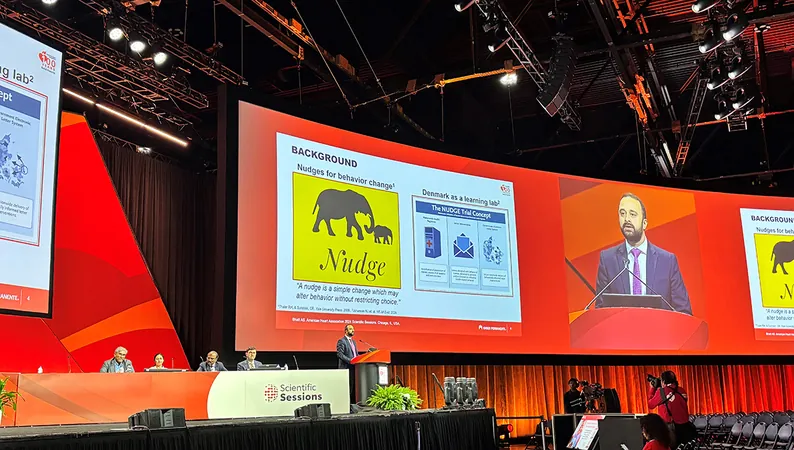
Email Nudges: A Game-Changer for Flu Vaccination in Acute MI Patients?
2024-11-17
Author: John Tan
CHICAGO, IL
Recent findings from a comprehensive analysis of the NUDGE-FLU trial illuminate the power of targeted email reminders in encouraging flu vaccinations among patients with a history of acute myocardial infarction (MI). This group is particularly susceptible to severe cardiovascular complications brought on by influenza, making vaccination critical.
According to the research, email messages that emphasized the cardiovascular benefits of flu shots proved to be especially motivating for patients who were hesitant about vaccinations, particularly those who had skipped their flu shot the previous year. Younger patients who experienced recent MIs also showed greater responsiveness to these targeted reminders.
Dr. Ankeet S. Bhatt from Kaiser Permanente San Francisco Medical Center presented these findings during a press conference ahead of his presentation at the American Heart Association 2024 Scientific Sessions. He pointed out that influenza not only affects the general population's health but also significantly heightens the risk of severe cardiovascular events, including acute MI.
The connection between flu vaccination and reduced cardiovascular risks is supported by earlier studies, such as the IAMI trial conducted in 2021. This trial indicated that for patients with a history of MI, getting vaccinated against influenza could lower the risk of subsequent cardiovascular incidents for up to a year. Despite this compelling evidence and corresponding recommendations for vaccination as a strategy for secondary prevention, many high-risk patients are still not getting their flu shots.
The NUDGE-FLU initiative originates from Denmark, where researchers effectively utilized the national email system to deliver reminders to participants about their flu vaccinations. Dr. Orly Vardeny from the Minneapolis VA Health Care System underscored how crucial flu vaccination can be, noting that during the 2023-2024 flu season alone, influenza led to approximately 34 million symptomatic cases, resulting in 15 million medical consultations, over 380,000 hospitalizations, and about 17,000 deaths in the U.S. Nearly half of those hospitalized had existing cardiovascular conditions.
Vardeny emphasized that the decision to get vaccinated often depends on individuals' healthcare choices each year. There is a distinct group of people who are undecided about vaccination, and targeting this cohort could significantly influence overall vaccination rates.
The study revealed that a simple adjustment—adding a sentence about the flu shot's role in reducing myocardial infarction and heart failure risks—resulted in substantial increases in flu shot uptake among those with a history of acute MI. The findings from the NUDGE-FLU trials highlighted a potential path forward for improving vaccination rates in high-risk populations.
One important factor raised by researchers is whether the success of these nudges could be replicated outside Denmark, especially in the United States where healthcare systems differ significantly. In the U.S., systems also exist that could facilitate similar communication with patients—such as online patient portals and electronic health records—which could enhance tracking and reminders for vaccinations.
However, Dr. Bhatt noted significant challenges lie ahead. With growing skepticism regarding vaccines in the U.S., more validation studies are essential to determine how effectively these strategies can work to mitigate implementation gaps in flu vaccination.
In their commentary published in JAMA Cardiology, Dr. Mohammad Madjid from UCLA and Dr. Payam Safavi-Naeini from the Texas Heart Institute affirmed that while targeted messaging holds promise, the nuances of the U.S. healthcare landscape—marked by lower vaccination rates compared to countries like Denmark—must be considered. They cautioned against directly translating Danish study results to American populations without understanding underlying differences in health attitudes and access.
They also highlighted the broader societal issues contributing to vaccine hesitancy, including misinformation perpetuated through social media, suggesting that a coordinated approach involving multiple stakeholders—private sectors, governments, and healthcare professionals—is crucial to overcoming barriers to vaccination.
As the flu season approaches, these insights could be vital in reshaping strategies to protect the health of millions, particularly those at highest risk. Will effective email nudges transform the way high-risk patients view flu vaccinations in the U.S.? Only time will tell.




 Brasil (PT)
Brasil (PT)
 Canada (EN)
Canada (EN)
 Chile (ES)
Chile (ES)
 España (ES)
España (ES)
 France (FR)
France (FR)
 Hong Kong (EN)
Hong Kong (EN)
 Italia (IT)
Italia (IT)
 日本 (JA)
日本 (JA)
 Magyarország (HU)
Magyarország (HU)
 Norge (NO)
Norge (NO)
 Polska (PL)
Polska (PL)
 Schweiz (DE)
Schweiz (DE)
 Singapore (EN)
Singapore (EN)
 Sverige (SV)
Sverige (SV)
 Suomi (FI)
Suomi (FI)
 Türkiye (TR)
Türkiye (TR)